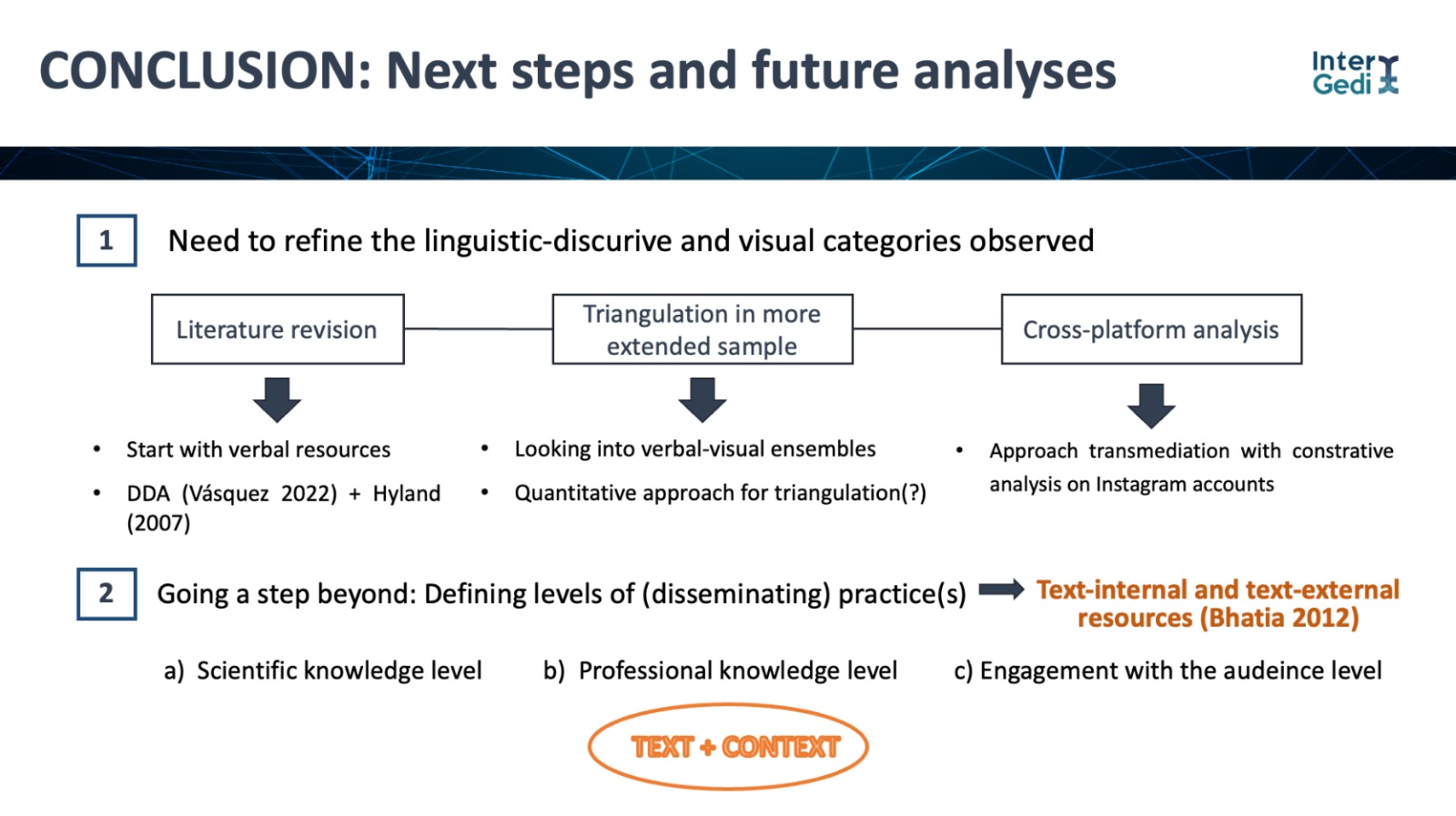AJL2023: Ana Sancho examines recontextualisation and remediation practices in physiotherapy Twitter accounts

Our PhD candidate Ana E. Sancho-Ortiz participated in the XXXVII Congreso Internacional de la Asociación de Jóvenes Lingüistas (AJL2023). This year’s edition took place at the Universidad Complutense de Madrid from the 6th to the 8th of November.
In her paper, titled “Recontextualisation and remediation in Twitter for science dissemination: Analysing dissemination on physiotherapy Twitter accounts”, Ana presented a pilot study in which she examined the practices of recontextualisation and remediation observed in the tweets produced by two Twitter accounts focused on physiotherapy. For this, she carried out a multimodal analysis of the most salient verbal and visual features found in 60 tweets from the two accounts, which were taken from her corpus. The results of her study revealed that most of the tweets used visuals as conceptual structures while the verbal mode was used to represent narrative structures. These findings can help better understand the dissemination and recontextualization practices used by the scientific community in digital platforms nowadays.
The abstract of Ana’s talk can be consulted as follows:
Recontextualisation and remediation in Twitter for science dissemination: Analysing dissemination on physiotherapy Twitter accounts
The widespread concern within the scientific community with the democratization of science has motivated a push towards the comprehensibility and accessibility of specialised knowledge from expert and non-expert audiences. This phenomenon, generally referred to as popularization or dissemination, entails reducing the knowledge asymmetry between audience types (Engberg, 2020) through processes of recontextualisation and remediatisation (Bondi & Cacchiani., 2016; Calsamiglia & Van Dijk, 2004). In this context and in an attempt to overcome the limitations of traditional journal publications (Mur-Dueñas & Lorés, 2022), researchers have directed their interest towards digital platforms and their affordances as spaces for knowledge recontextualisation (Luzón & Pérez-Llantada, 2019; Puschmann, 2015).
Considering all this, the present paper studies the practices of recontextualisation and remediation observed in Twitter accounts for science dissemination within the field of physiotherapy. For this purpose, it presents a pilot study on the use of multimodality as a recontextualisation means on two individual Twitter accounts extracted from the HealthTweet Corpus—the work-in-progress corpus which I am compiling for my PhD thesis. Thus, taking as a reference the mode categories identified by the New London Group (1996) and Kress and van Leeuwen’s (2021) theory of visual grammar, this study analyses the most salient visual and verbal features identified in a closed set of 60 tweets (30 per account), as well as the functions these fulfill in the disseminating process. Its preliminary findings point, on the one hand, to a reliance on visuals as conceptual rather than as narrative structures, and on the other hand, to a predominance of the verbal mode and its functionality to represent narrative structures.
References
Bondi, M., & Cacchiani, S. (Eds.). (2016). Discourse in and through the media: Recontextualizing and reconceptualizing expert discourse. Cambridge Scholars Publishing.
Calsamiglia, H., & Van Dijk, T. A. (2004). Popularization discourse and knowledge about the Genome. Discourse & society, 15(4), 369-389.
Cazden, C. et al. (1996). A Pedagogy of Multiliteracies: Designing Social Futures. Routledge.
Engberg, J. (2020). Multimodal institutional knowledge dissemination and popularization in an EU context–explanatory ambition in focus. The Context and Media of Legal Discourse, 50-76.
Kress, G. & van Leeuwen, T. (2021). Reading Images: The Grammar of Visual Design. Routledge.
Luzón, M. J., & Pérez-Llantada, C. (2019). Science Communication on the Internet: old genres meet new genres (Vol. 308). John Benjamins Publishing Company.
Mur-Dueñas, P., & Lorés, R. (2022). When Science Communication Becomes Parascience: Blurred Boundaries, Diffuse Roles. Publications, 10(2), 14.
Puschmann, C. (2015). A digital mob in the ivory tower? Context collapse in scholarly communication online. Discourse in and through the media: Recontextualizing and Reconceptualizing expert discourse, 22-45.
